Correspondence between Field Marshal Lord William Birdwood and Lady Janetta Birdwood, 1915 - Part 8
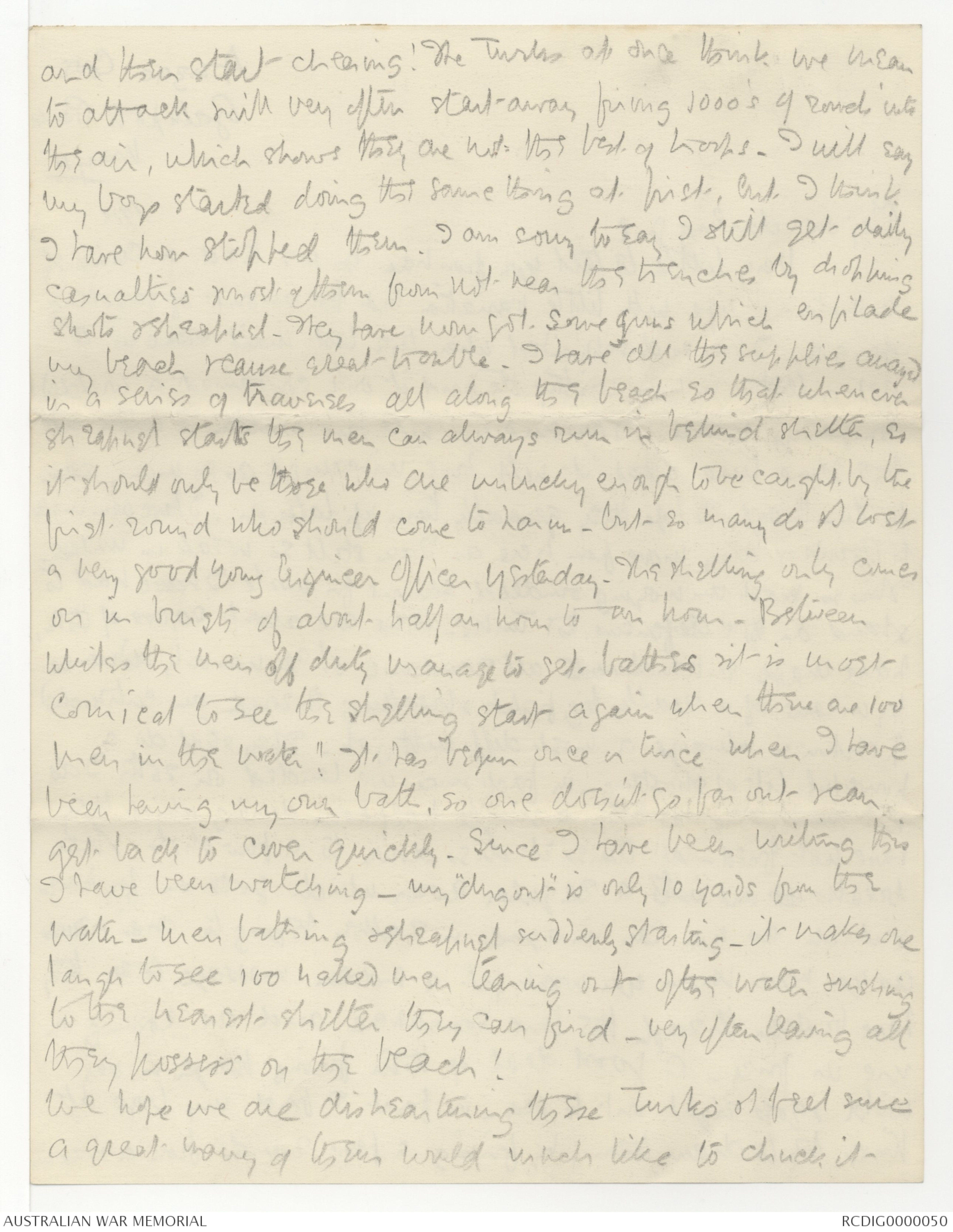
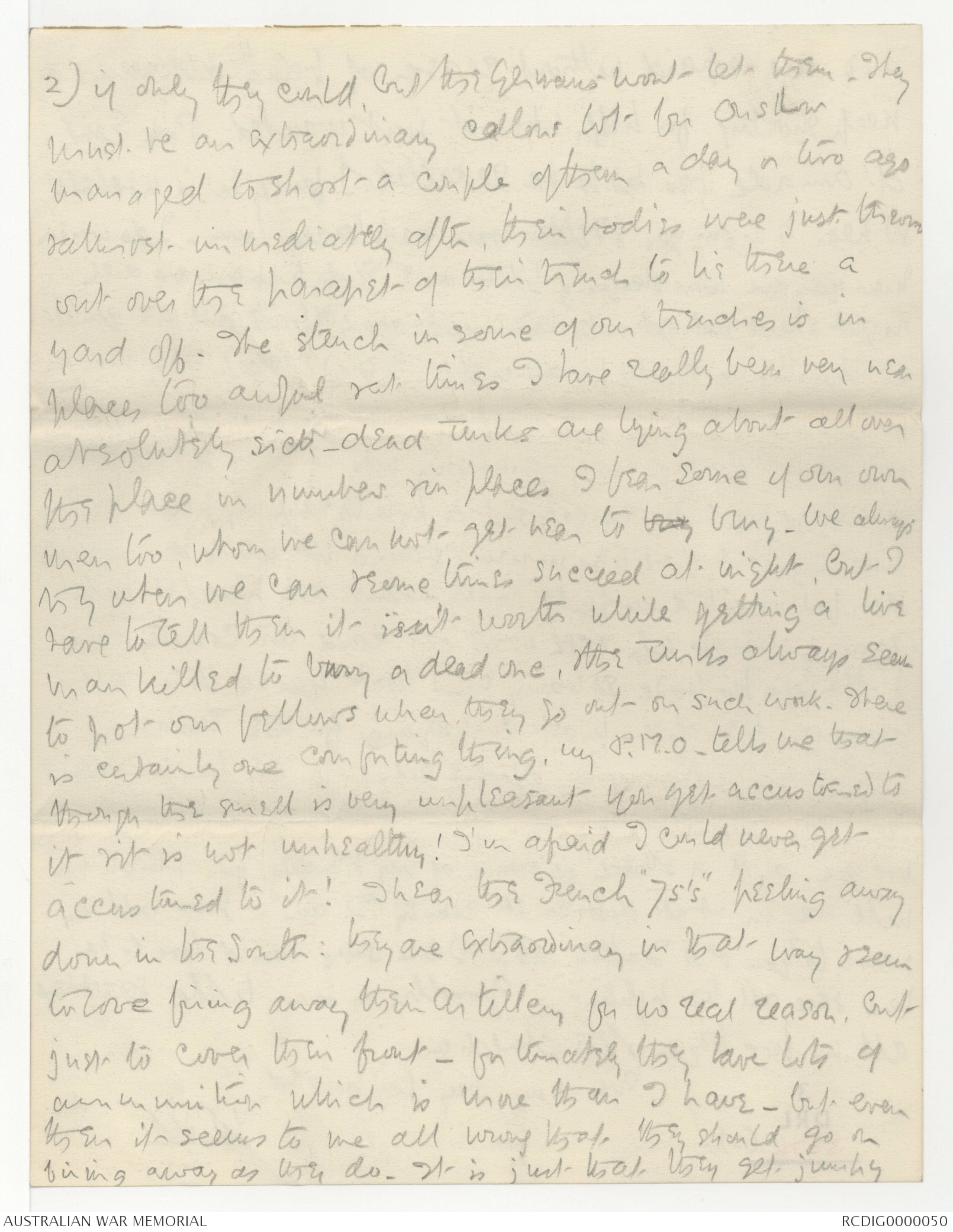
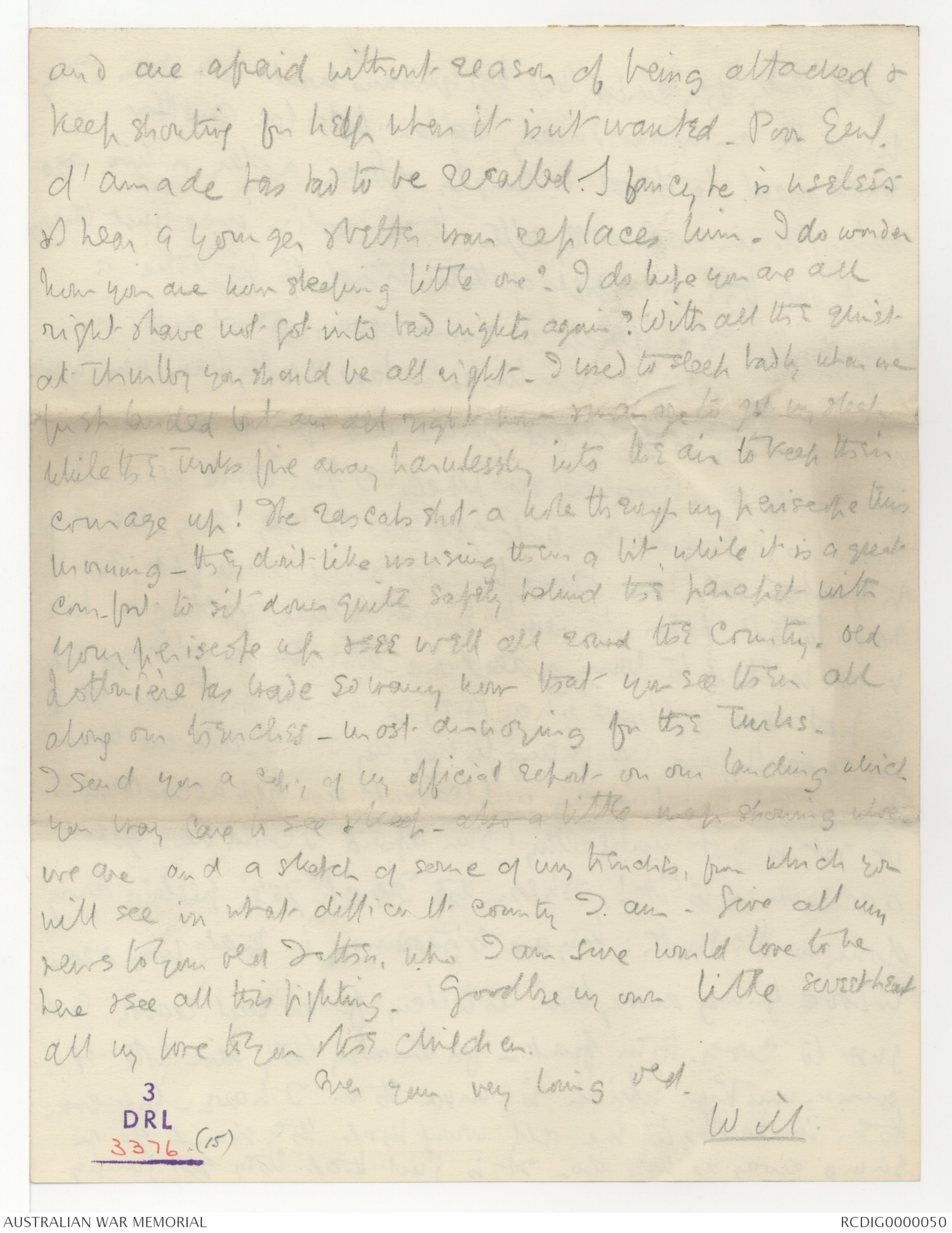
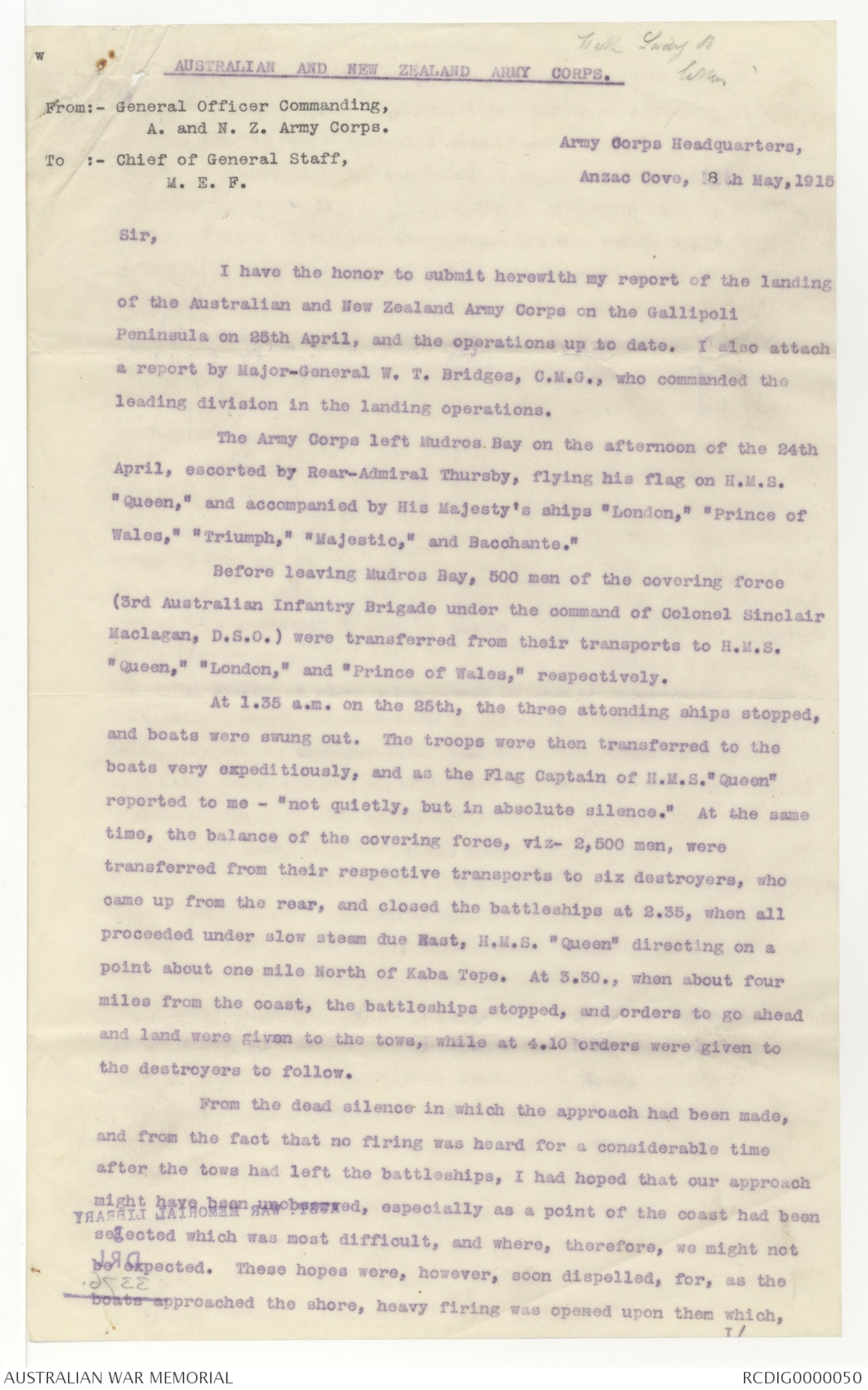
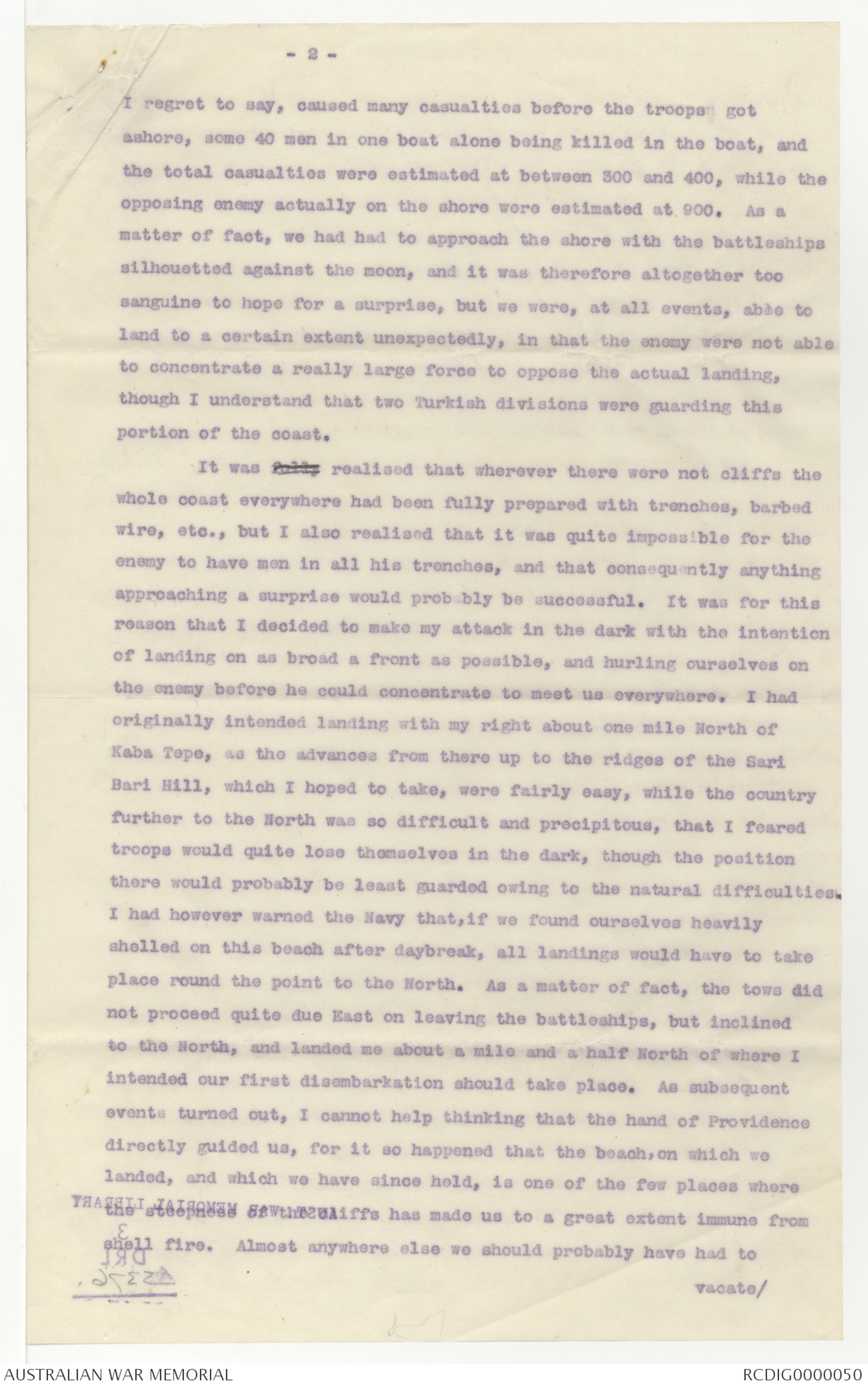
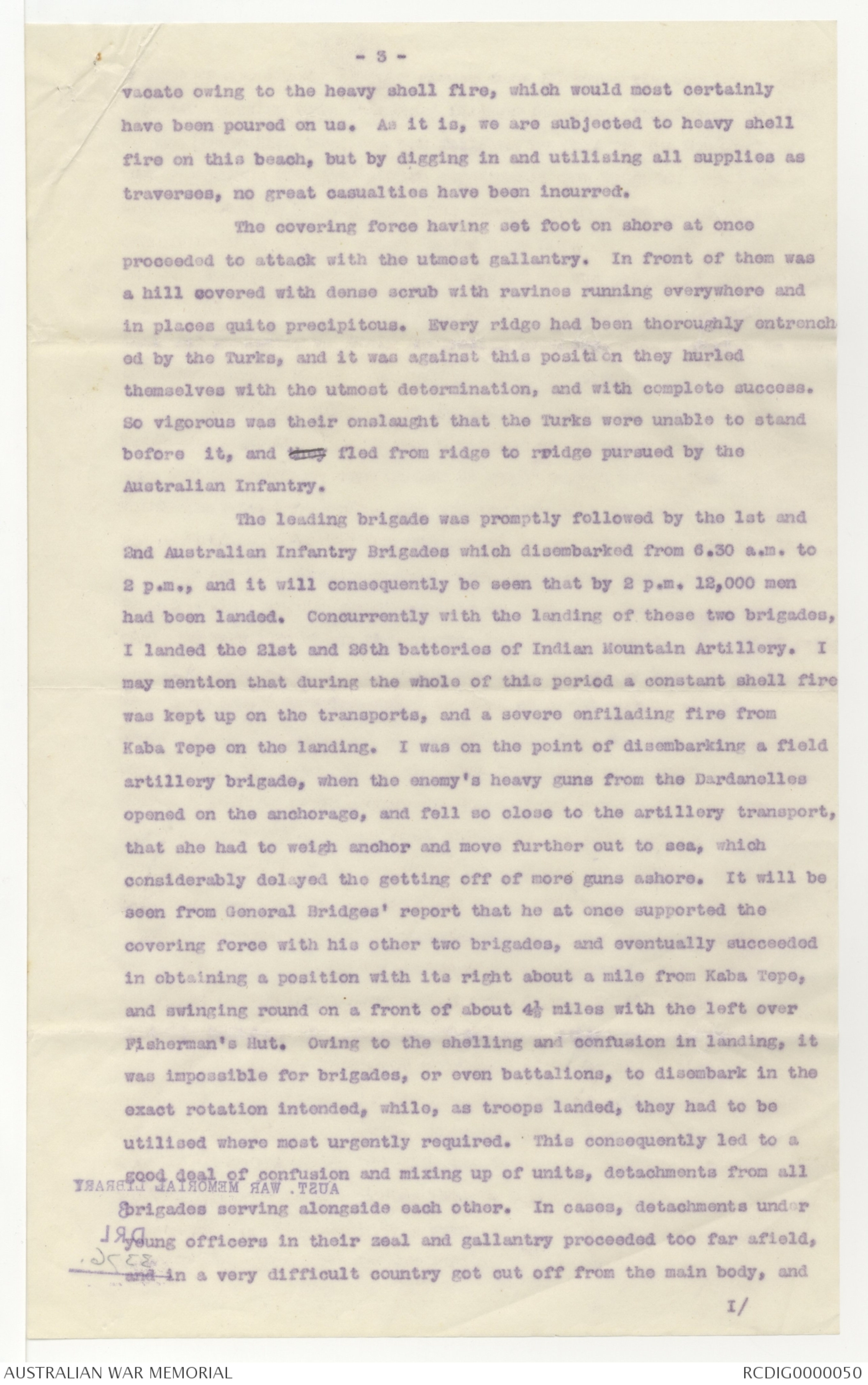
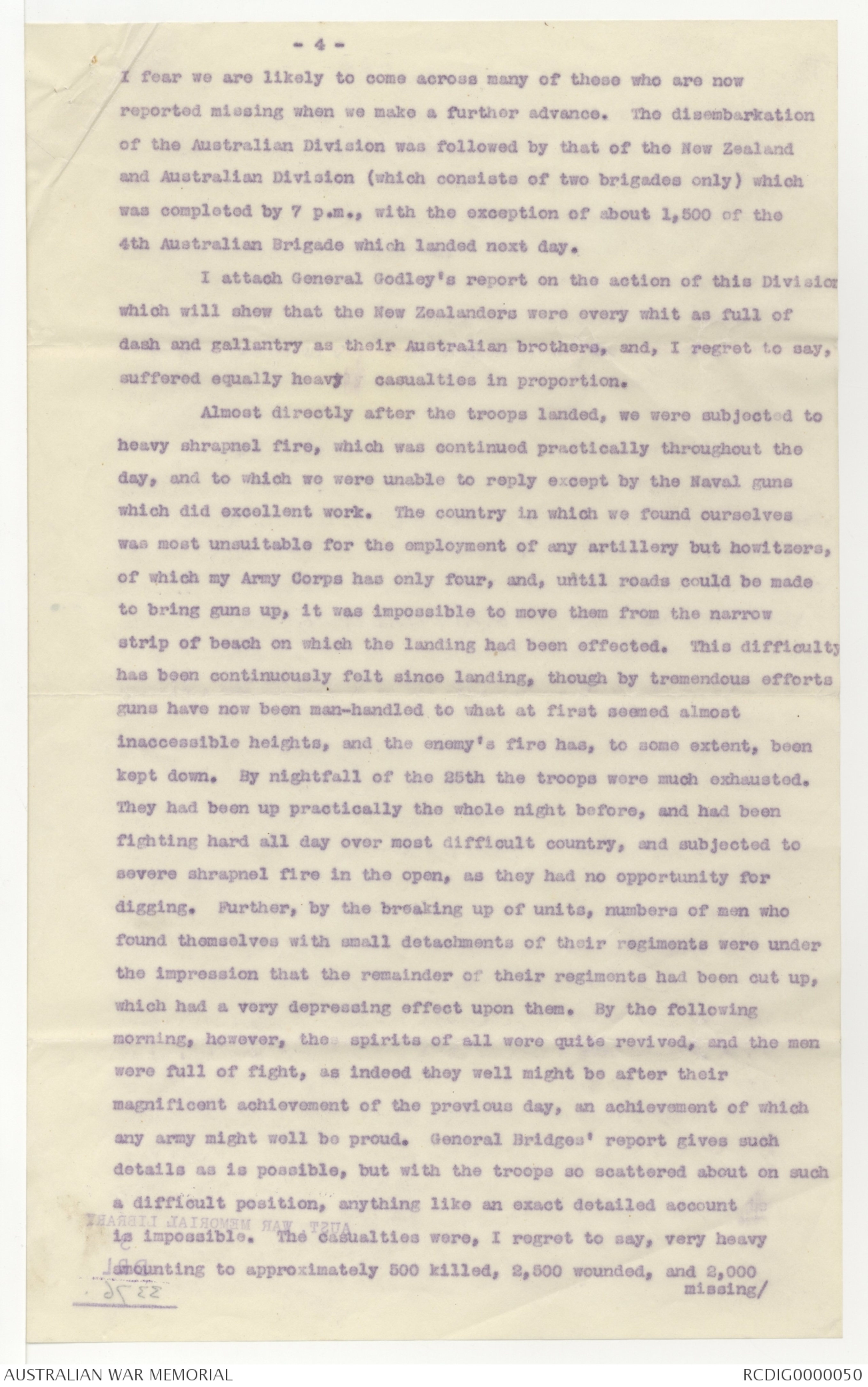
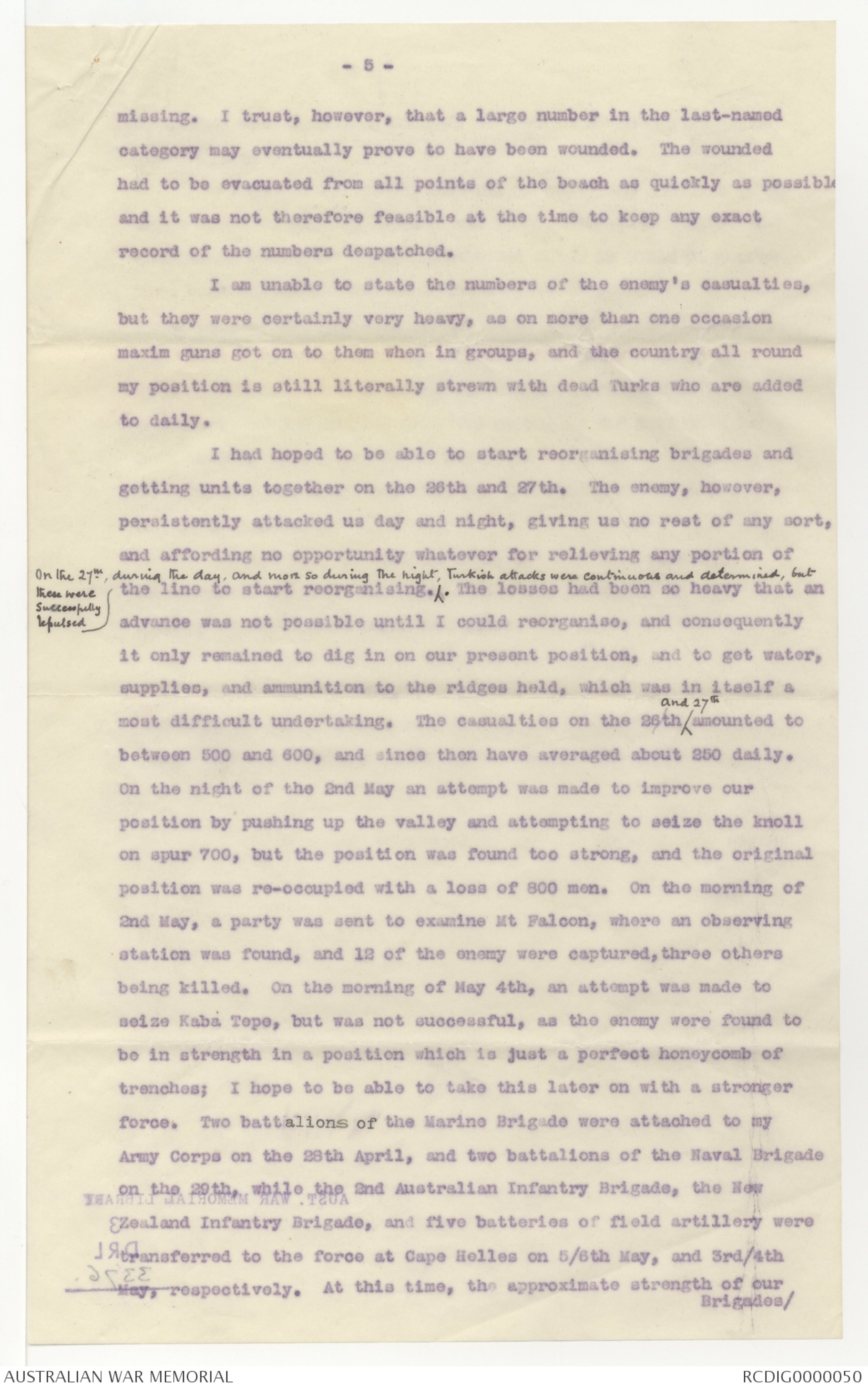
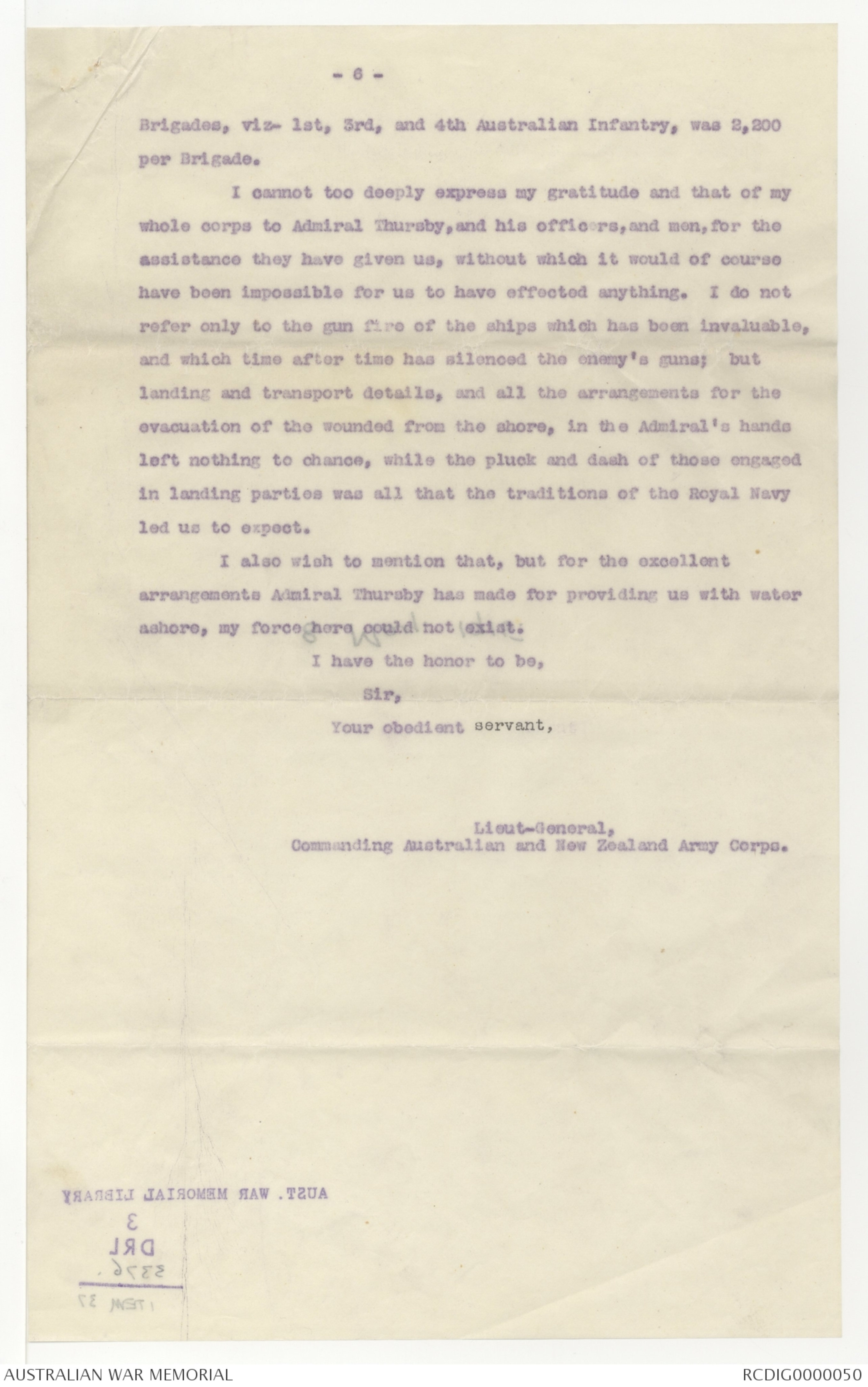
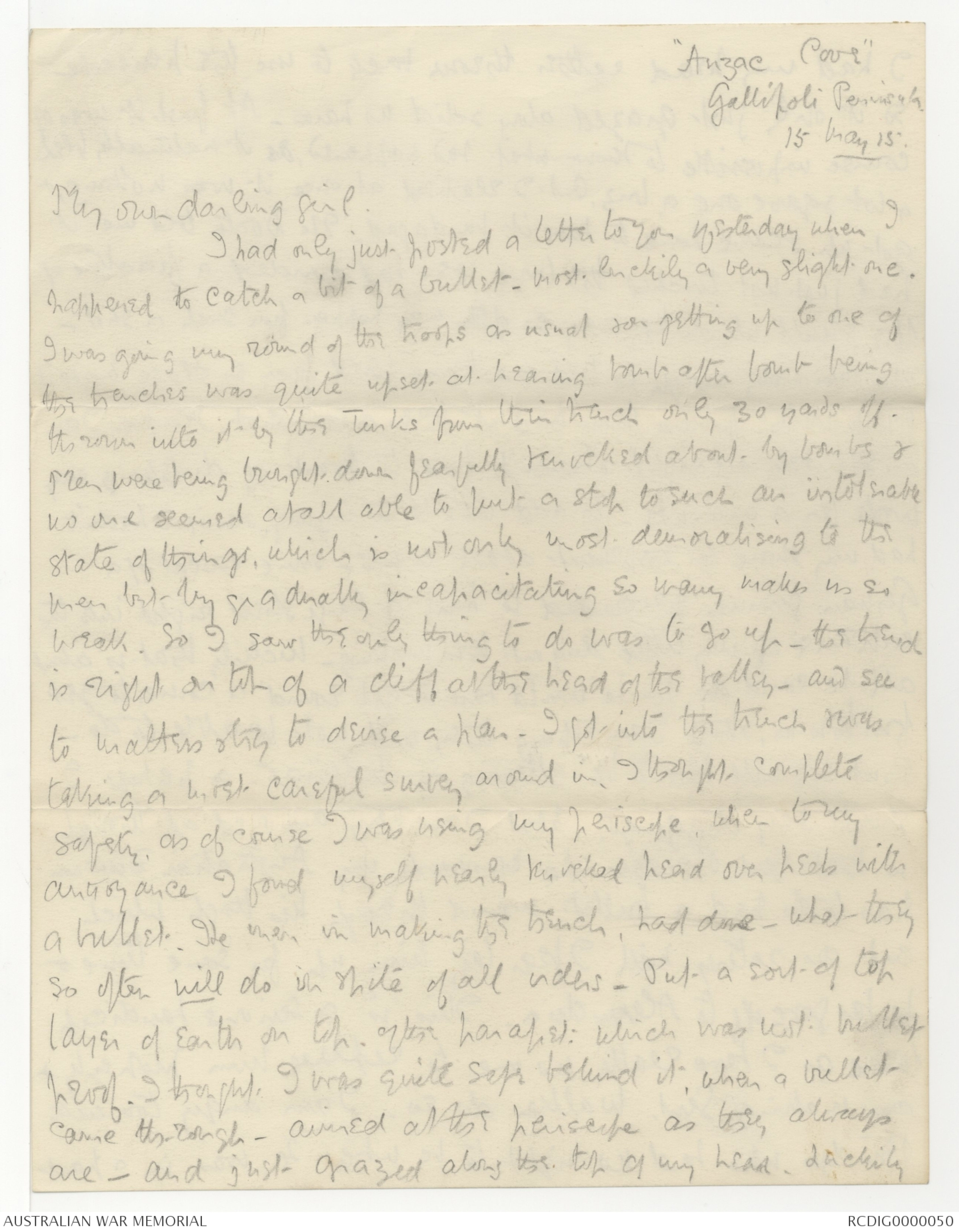
and then start cheering! The Turks at once think we mean
to attack & will very often start away firing 1000's of rounds into
the air, which shows they are not the best of troops. I will say
my boys started doing the same thing at first, but I think
I have now stopped them. I am sorry to say I still get daily
casualties & most of them from not near the trenches by dropping
shots & shrapnel. They have now got some guns which enfilade
my beach & cause great trouble. I have all the supplies arranged
in a series of traverses all along the beach so that whenever
shrapnel starts the men can always run in behind shelter, so
it should only be those who are unlucky enough to be caught by the
first round who should come to harm, but so many do & I lost
a very good young Engineer Officer yesterday. The shelling only comes
on in bursts of about half an hour to an hour. Between
whiles the men off duty manage to get bathes & it is most
comical to see the shelling start again when there are 100
men in the water!! It has begun once or twice when I have
been having my own bath, so one doesn't go far out & can
get back to cover quickly. Since I have been writing this
I have been watching - my "dugout" is only 10 yards from the
water - men bathing & shrapnel suddenly starting - it makes one
laugh to see 100 naked men tearing out of the water & rushing
to the nearest shelter they can find - very often leaving all
they possess on the beach!
We hope we are disheartening these Turks & I feel sure
a great many of them would much like to chuck it
2) if only they could, but the Germans wont let them. They
must be an extraordinary callous lot for Onslow
managed to shoot a couple of them a day or two ago
& almost immediately after, their bodies were just thrown
out over the parapet of their trench to lie there a
yard off. The stench in some of our trenches is in
places too awful & at times I have really been very near
absolutely sick - dead Turks are lying about all over
the place in numbers & in places I fear some of our own
men too, whom we can not get near to bry bury. We always
try when we can & some times succeed at night, but I
have to tell them it isn't worth while getting a live
man killed to bury a dead one, & the Turks always seem
to pot our fellows when they go out on such work. There
is certainly one comforting thing, my P.M.O. tells me that
though the smell is very unpleasant you get accustomed to
it & it is not unhealthy! I'm afraid I could never get
accustomed to it! I hear the French "75's" peeling away
down in the South: they are extraordinary in that way & seem
to love firing away their Artillery for no real reason, but
just to cover their front - fortunately they have lots of
ammunition which is more than I have - but even
then it seems to me all wrong that they should go on
firing away as they do. It is just that they get jumpy
and are afraid without reason of being attacked &
keep shouting for help when it isn't wanted. Poor Genl.
d'Amade has had to be recalled. I fancy he is useless
& I hear a younger & better man replaces him. I do wonder
how you are now sleeping little one? I do hope you are all
right & have not got into bad nights again? With all the quiet
at Thurlby you should be all right. I used to sleep badly when we
first landed but am all right now, & managed to get my sleep
while the Turks fire away harmlessly into the air to keep their
courage up! The rascals shot a hole through my periscope this
morning - they don't like us using them a bit, while it is a great
comfort to sit down quite safely behind the parapet with
your periscope up & see well all round the Country. Old
Lotbiniěre has made so many now that you see them all
along our trenches - most annoying for the Turks.
I send you a copy of my official report on our landing which
you may care to see & keep - also a little map showing where
we are and a sketch of some of my trenches, from which you
will see in what difficult country I am. Give all my
news to your old Father, who I am sure would love to be
here & see all this fighting. Goodbye my own little sweetheart
all my love to you & the children.
Ever your very loving old,
Will
[*3 DRL 3376 (15)*]
[*With Lady B letter*]
AUSTRALIAN AND NEW ZEALAND ARMY CORPS.
From:- General Officer Commanding,
A. and N. Z. Army Corps.
To:- Chief of General Staff,
M. E. F.
Army Corps Headquarters,
Anzac Cove, 18th May, 1915
Sir,
I have the honor to submit herewith my report of the landing
of the Australian and New Zealand Army Corps on the Gallipoli
Peninsula on 25th April, and the operations up to date. I also attach
a report by Major-General W. T. Bridges, C.M.G., who commanded the
leading division in the landing operations.
The Army Corps left Mudros Bay on the afternoon of the 24th
ApriI, escorted by Rear-Admiral Thursby, fIying his flag on H.M.S.
"Queen," and accompanied by His Majesty's ships "London," "Prince of
Wales," "Triumph," "Majestic," and Bacchante."
Before leaving Mudros Bay, 500 men of the covering force
(3rd Australian Infantry Brigade under the command of Colonel Sinclair
Maclagan, D.S.0.) were transferred from their transports to H.M.S.
"Queen," "London," and "Prince of Wales," respectively.
At 1.35 a.m. on the 25th, the three attending ships stopped,
and boats were swung out. The troops were then transferred to the
boats very expeditiously, and as the Flag Captain of H.M.S. "Queen"
reported to me - "not quietly, but in absolute silence." At the same
time, the balance of the covering force, viz- 2,500 men, were
transferred from their respective transports to six destroyers, who
came up from the rear, and closed the battleships at 2.35, when all
proceeded under slow steam due East, H.M.S. "Queen" directing on a
point about one mile North of Kaba Tepe. At 3.30., when about four
miles from the coast, the battleships stopped, and orders to go ahead
and 1and were given to the tows, while at 4.10 orders were given to
the destroyers to follow.
From the dead silence in which the approach had been made,
and from the fact that no firing was heard for a considerable time
after the tows had left the battleships, I had hoped that our approach
might have been unobserved, especially as a point of the coast had been
selected which was most difficult, and where, therefore, we might not
be expected. These hopes were, however, soon dispelled, for, as the
boats approached the shore, heavy firing was opened upon them which,
I/
-2-
I regret to say, caused many casualties before the troops got
ashore, some 40 men in one boat alone being killed in the boat, and
the total casualties were estimated at between 300 and 400, while the
opposing enemy actually on the shore were estimated at 900. As a
matter of fact, we had had to approach the shore with the battleships
silhouetted against the moon, and it was therefore altogether too
sanguine to hope for a surprise, but we were, at all events, able to
land to a certain extent unexpectedly, in that the enemy were not able
to concentrate a really large force to oppose the actual landing,
though I understand that two Turkish divisions were guarding this
portion of the coast.
It was fully realised that wherever there were not cliffs the
whole coast everywhere had been fully prepared with trenches, barbed
wire etc., but I also realised that it was quite impossible for the
enemy to have men in all his trenches, and that consequently anything
approaching a surprise would probably be successful. It was for this
reason that I decided to make my attack in the dark with the intention
of landing on as broad a front as possible, and hurling ourselves on
the enemy before he could concentrate to meet us everywhere. I had
originally intended landing with my right about one mile North of
Kaba Tepe, as the advances from there up to the ridges of the Sari
Bari Hill, which I hoped to take, were fairly easy, while the country
further to the North was so difficult and precipitous, that I feared
troops would quite lose themselves in the dark, though the position
there would probably be least guarded owing to the natural difficulties.
I had however warned the Navy that, if we found ourselves heavily
shelled on this beach after daybreak, all landings would have to take
place round the point to the North. As a matter of fact, the tows did
not proceed quite due East on leaving the battleships, but inclined
to the North, and landed me about a mile and a half North of where I
intended our first disembarkation should take place. As subsequent
events turned out, I cannot help thinking that the hand of Providence
directly guided us, for it so happened that the beach, on which we
landed, and which we have since held, is one of the few places where
the steepness of the cliffs has made us to a great extent immune from
shell fire. Almost anywhere else we should probably have had to
vacate/
- 3 -
vacate owing to heavy shell fire, which would most certainly
have been poured on us. As it is, we are subjected to heavy shell
fire on this beach, but by digging in and utilising all supplies as
traverses, no great casualties have incurred.
The covering force having set foot on shore at once
proceeded to attack with the utmost gallantry. In front of them was
a hill covered with dense scrub with ravines running everywhere and
in places quite precipitous. Every ridge had been thoroughly entrenched
by the Turks, and it was against this position they hurled
themselves with the utmost determination, and with complete success.
So vigorous was their onslaught that the Turks were unable to stand
before it, and they fled from ridge to rridge pursued by the
Australian Infantry.
The leading brigade was promptly followed by the 1st and
2nd Australian Infantry Brigades which disembarked from 6.30 a.m. to
2 p.m., and it will consequently be seen that by 2 p.m. 12,000 men
had been landed. Concurrently with the landing of these two brigades,
I landed the 21st and 26th batteries of Indian Mountain Artillery. I
may mention that during the whole of this period a constant shell fire
was kept up on the transports, and a severe enfilading fire from
Kaba Tepe on the landing. I was on the point of disembarking a field
artillery brigade, when the enemy's heavy guns from the Dardanelles
opened on the anchorage, and fell so close to the artillery transport,
that she had to weigh anchor and move further out to sea, which
considerably delayed the getting off of more guns ashore. It will be
seen from General Bridges' report that he at once supported the
covering force with his other two brigades, and eventually succeeded
in obtaining a position with its right about a mile from Kaba Tepe,
and swinging round on a front of about 4½ miles with the left over
Fisherman's Hut. Owing to the shelling and confusion in landing, it
was impossible for brigades, or even battalions, to disembark in the
exact rotation intended, while, as troops landed, they had to be
utilised where most urgently required. This consequently led to a
good deal of confusion and mixing up of units, detachments from all
brigades serving alongside each other. In cases, detachments under
young officers in their zeal and gallantry proceeded too far afield,
and in a very difficult country got cut off from the main body, and
I/
- 4 -
I fear we are likely to come across many of these who are now
reported missing when we make a further advance. The disembarkation
of the Australian Division was followed by that of the New Zealand
and Australian Division (which consists of two brigades only) which
was completed by 7 p.m., with the exception of about 1,500 of the
4th Australian Brigade which landed next day.
I attach General Godley's report on the action of this Division
which will show that the New Zealanders were every whit as full of
dash and gallantry as their Australian brothers, and, I regret to say,
suffered equally heavy casualties in proportion.
Almost directly after the troops landed, we were subjected to
heavy shrapnel fire, which was continued practically throughout the
day, and to which we were unable to reply except by the Naval guns
which did excellent work. The country in which we found ourselves
was most unsuitable for the employment of any artillery but howitzers,
of which my Army Corps has only four, and, until roads could be made
to bring guns up, it was impossible to move them from the narrow
strip of beach on which the landing has been effected. This difficulty
has been continuously felt since landing, though by tremendous efforts
guns have now been man-handled to what at first seemed almost
inaccessible heights, and the enemy's fire has, to some extent, been
kept down. By nightfall of the 25th the troops were much exhausted.
They had been up practically the whole night before, and had been
fighting hard all day over most difficult country, and subjected to
severe shrapnel fire in the open, as they had no opportunity for
digging. Further, by the breaking up of units, numbers of men who
found themselves with small detachments of their regiments were under
the impression that the remainder of their regiments had been cut up,
which had a very depressing effect upon them. By the following
morning, however, the spirits of all were quite revived, and the men
were full of fight, as indeed they well might be after their
magnificent achievement of the previous day, an achievement of which
any army might well be proud. General Bridges' report gives such
details as is possible, but with the troops so scattered about on such
a difficult position, anything like an exact detailed account
is impossible. The casualties were, I regret to say, very heavy
amounting to approximately 500 killed, 2,500 wounded, and 2,000
missing/
- 5 -
missing. I trust, however, that a large number in the last-named
category may eventually prove to have been wounded. The wounded
had to be evacuated from all points of the beach as quickly as possible
and it was not therefore feasible at the time to keep any exact
record of the numbers despatched.
I am unable to state the numbers of the enemy's casualties,
but they were certainly very heavy, as on more than one occasion
maxim guns got on to them when in groups, and the country all round
my position is still literally strewn with dead Turks who are added
to daily.
I had hoped to be able to start reorganising brigades and
getting units together on the 26th and 27th. The enemy, however,
persistently attacked us day and night, giving us no rest of any sort,
and affording no opportunity whatever for relieving any portion of
the line to start reorganising. ∧On the 27th, during the day, and more so during the night, Turkish attacks were continuous and determined, but these were successfully repulsed. The losses had been so heavy that an
advance was not possible until I could reorganise, and consequently
it only remained to dig in on our present position, and to get water,
supplies, and ammunition to the ridges held, which was in itself a
most difficult undertaking. The casualties on the 26th ∧and 27th amounted to
between 500 and 600, and since then have averaged about 250 daily.
On the night of the 2nd May an attempt was made to improve our
position by pushing up the valley and attempting to seize the knoll
on spur 700, but the position was found too strong, and the original
position was re-occupied with a loss of 800 men. On the morning of
2nd May, a party was sent to examine Mt Falcon, where an observing
station was found, and 12 of the enemy were captured, three others
being killed. On the morning of May 4th, an attempt was made to
seize Kaba Tepe, but was not successful, as the enemy were found to
be in strength in a position which is just a perfect honeycomb of
trenches; I hope to be able to take this later on with a stronger
force. Two battalions of the Marine Brigade were attached to my
Army Corps on the 28th April, and two battalions of the Naval Brigade
on the 29th, while the 2nd Australian Infantry Brigade, the New
Zealand Infantry Brigade, and five batteries of field artillery were
transferred to the force at Cape Helles on 5/6th May, and 3rd/4th
May, respectively. At this time, the approximate strength of our
Brigades/
- 6 -
Brigades, viz- 1st, 3rd, and 4th Australian Infantry, was 2,200
per Brigade.
I cannot too deeply express my gratitude and that of my
whole corps to Admiral Thursby, and his officers, and men, for the
assistance they have given us, without which it would of course
have been impossible for us to have effected anything. I do not
refer only to the gun fire of the ships which has been invaluable,
and which time after time has silenced the enemy's guns; but
landing and transport details, and all the arrangements for the
evacuation of the wounded from the shore, in the Admiral's hands
left nothing to chance, while the pluck and dash of those engaged
in landing parties was all that the traditions of the Royal Navy
led us to expect.
I also wish to mention that, but for the excellent
arrangements Admiral Thursby has made for providing us with water
ashore, my force here could not exist.
I have the honor to be,
Sir,
Your obedient servant,
Lieut-General,
Commanding Australian and New Zealand Army Corps.
"Anzac Cove"
Gallipoli Peninsula
15 May 15.
My own darling girl.
I had only just posted a letter to you yesterday when I
happened to catch a bit of a bullet - most luckily a very slight one.
I was going my round of the troops as usual & on getting up to one of
the trenches was quite upset at hearing bomb after bomb being
thrown into it by the Turks from their trench only 30 yards off.
Men were being brought down fearfully knocked about by bombs &
no one seemed at all able to put a stop to such an intolerable
state of things, which is not only most demoralising to the
men but by gradually incapacitating so many makes us so
weak. So I saw the only thing to do was to go up - the trench
is right on top of a cliff at the head of the valley - and see
to matters & try to devise a plan. I got into the trench & was
taking a most careful survey around in, I thought complete
safety, as of course I was using my periscope, when to my
annoyance I found myself nearly knocked head over heels with
a bullet. The men in making the trench, had done - what they
so often will do in spite of all orders - Put a sort of top
Iayer of earth on top. of the parapet: which was not bullet
proof. I thought I was quite safe behind it, when a bullet
came through - aimed at the periscope as they always
are - and just grazed along the top of my head. Luckily
 Jane Hyland
Jane HylandThis transcription item is now locked to you for editing. To release the lock either Save your changes or Cancel.
This lock will be automatically released after 60 minutes of inactivity.